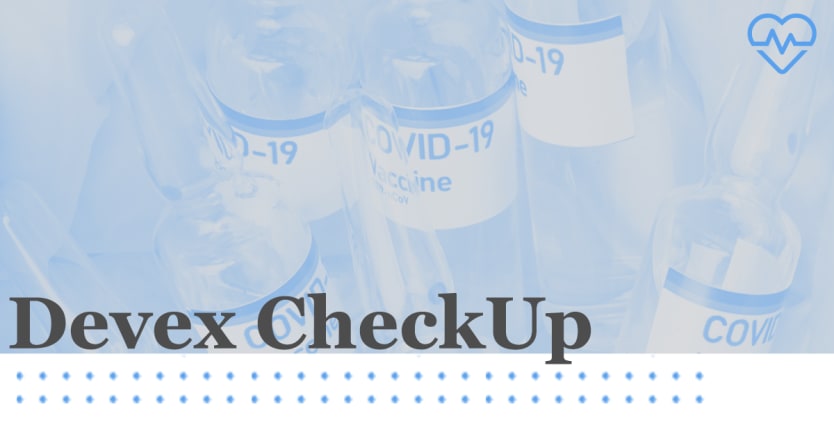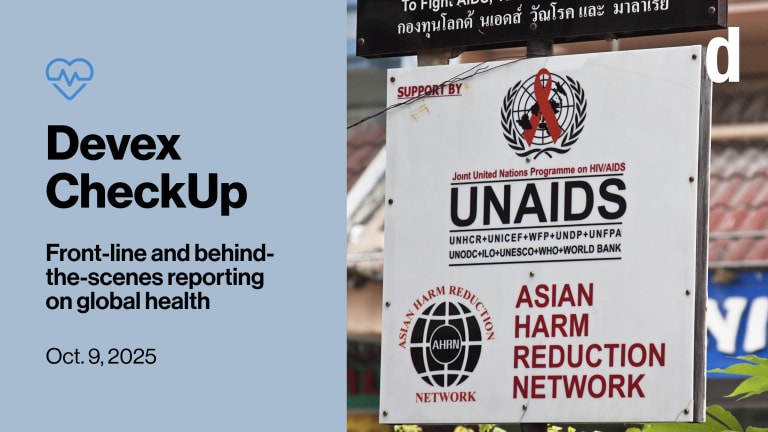Devex CheckUp: Inside the WHA: WHO’s trial by fire

This is a preview of Devex CheckUp
Sign up to this newsletter for exclusive global health news and insider insights, in your inbox every Thursday.
The 74th World Health Assembly is well on its way, and from vaccine equity to pandemic treaty discussions, it’s checking all the boxes so far. One question still hangs in the balance: What will it take to strengthen the World Health Organization?
• While deliberations over a “pandemic treaty” will be taken in a special WHA session in November, member states want a working group to propose actions to strengthen WHO preparedness and response to health emergencies at next year’s WHA.
• Experts hope these discussions would address WHO’s long-standing inflexible financing. Only 8% of WHO’s funding for its global COVID-19 response is flexible, paralyzing its ability to provide rapid support to countries. WHO emergencies director Dr. Mike Ryan is warning that WHO is in “real and imminent danger of being unable to sustain core functions for urgent priorities.”
• WHO needs to be more agile. The Independent Oversight and Advisory Committee for WHO Health Emergencies Programme expressed concerns over “the slow progress” of WHO’s investigation into sexual abuse allegations in DRC. A WHO mission to DRC last October resulted in recommendations for a system-wide strategy for preventing sexual exploitation and abuse, which has yet to be implemented, Sara Jerving reports.
• There have also been calls for the U.N. agency to be quick to take the next steps in studying the origins of the COVID-19 pandemic.
• On politics: The WHA adopted a resolution asking the head of WHO to ensure equitable access to COVID-19 vaccines in the occupied Palestinian territories, but not without opposition. Israel and several member states argued the resolution continues to politicize WHO.
Exclusive Q&A: Eradicating polio
The WHA will discuss the draft strategy for the Global Polio Eradication Initiative this week, which would set goals to banish polio from the planet. “The only yardstick for an eradication program is zero. Everything else is [a] failure,” WHO Director for Polio Eradication Aidan O’Leary, tells Jenny. In this exclusive interview, he talks about the challenges of increasing vaccination coverage, the need for accountability, and the need to include communities in the process.
Read: Q&A: WHO Director Aidan O'Leary on GPEI’s new plan to eradicate polio
Watch today
We are covering the week’s most important WHA conversations. Join us today, for sessions on strengthening WHO and health systems of the future.
+ Next up: Join us Tuesday June 1 from 9 a.m. ET for a Devex Pro event: The state of play in global health, with the Bill & Melinda Gates Foundation senior strategy adviser and interim director for the China country office, Steve Davis. Register now.
Be prepared
Along with a stronger WHO, the Independent Panel for Pandemic Preparedness and Response recommended a new council that would maintain a political commitment to pandemic preparedness and response. Speaking to Devex, Helen Clark, co-chair of the panel and former prime minister of New Zealand reiterated the need for a stronger WHO. “What we don't want is a situation where WHO is crying wolf every other day.”
To be effective, the panel’s proposals need to be accompanied by high-level political leadership, advance planning, and the inclusion of different stakeholders, experts tell Devex. In the words of Chandrika Bahadur, director at the SDG Academy: "The absolute worst time to make these plans is right in the middle of a pandemic.”
The vaccine production dilemma
Astrazeneca is trying to tap into its various manufacturing sites to fill gaps in vaccine supply to COVAX and other countries relying on the Serum Institute of India, which has halted exports of COVID-19 vaccines, CEO Pascal Soriot tells Raj Kumar.
He hopes donations from countries will help bridge the gap — a suggestion echoed by Thomas Cueni, director general at the International Federation of Pharmaceutical Manufacturers & Associations: “If you really want to get something done now, you really have to get rich countries to start sharing doses — now and not in four to five months’ time when everybody in the U.S., Europe, and the U.K. is vaccinated.”
What we’re reading:
Amid severe shortages, a new analysis identified the 19 countries’ health systems most at risk of running out of oxygen. [The Guardian]
Many Asian countries have fallen behind others in vaccinating their populations against COVID-19. [Irish Times]
The problem with medical jargon and its impact on the COVID-19 response. [NPR]

Search for articles
Most Read
- 1
- 2
- 3
- 4
- 5









